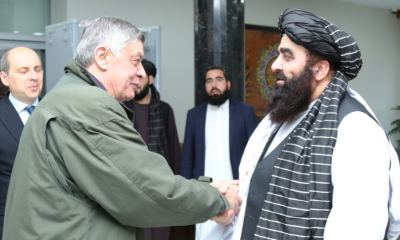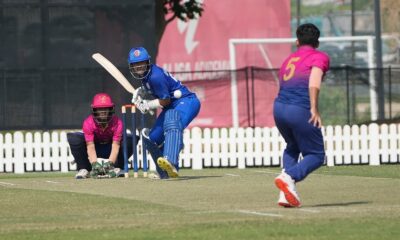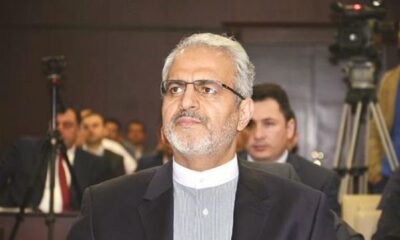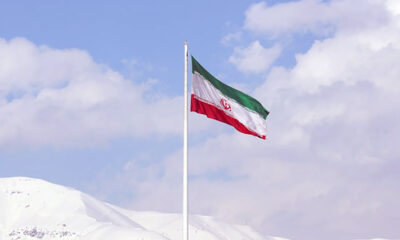Health
AstraZeneca’s Farxiga reduces death risk in heart failure patients

AstraZeneca's (AZN.L) blockbuster diabetes drug Farxiga led to significant reductions in the risk of hospitalization and death in people with all types of heart failure, according to study data released on Saturday.
The drug belongs to a class of medicines called SGLT2 inhibitors that were initially approved to treat type 2 diabetes. Since then, the drugs have been shown to benefit patients with chronic kidney and heart disease and prevent heart attacks.
Farxiga is the first heart failure medication to show mortality benefit across all forms of heart failure, the company said as reported by Reuters.
Detailed data from a study called 'DELIVER’ evaluating Farxiga in patients with a form of heart failure characterized by mildly reduced or preserved ejection fraction was presented at the European Society of Cardiology congress in Barcelona. Ejection fraction measures the heart's ability to pump oxygen-rich blood into the body.
Farxiga met the study's primary goal, inducing a statistically significant reduction in the risk of heart-related death, heart failure hospitalization and urgent heart failure visits by 18%.
A pooled analysis of DELIVER and another trial involving about 11,000 heart failure patients combined showed Farxiga reduced the risk of death from cardiovascular causes - including heart attacks - by 14%, and death from any cause by 10%. The drug also cut the risk of hospital admissions for heart failure by close to a third.
Heart failure occurs when the heart muscle becomes unable to pump blood as efficiently as it should, and can cause a range of serious health problems and death. Of the estimated 64 million heart failure patients globally, roughly half have reduced ejection fraction, which is equal to or less than 40%. The remainder have mildly reduced or preserved ejection fraction.
Health
Muttaqi appeals to WHO to help strengthen Afghanistan’s health sector
Hanan Balkhy, the World Health Organization’s director for the Eastern Mediterranean Regional Office, met in Kabul this week for talks with Amir Khan Muttaqi, the IEA’s foreign minister
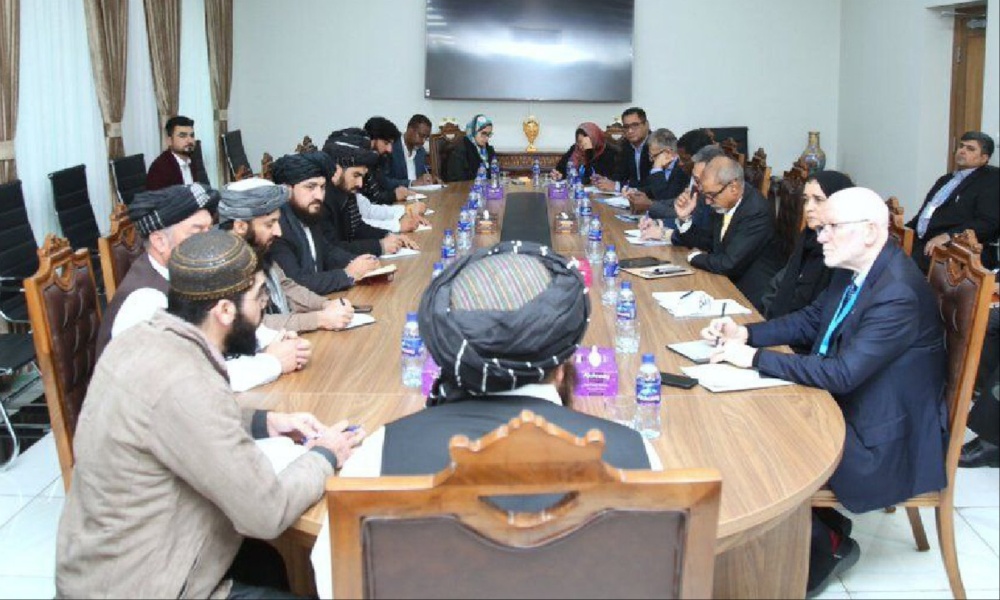
The Islamic Emirate has appealed to the World Health Organization to equip and strengthen Afghanistan’s health sector and to support Afghanistan’s pharmaceutical production sector.
Dr. Hanan Balkhy, the World Health Organization's director for the Eastern Mediterranean Regional Office, met in Kabul this week for talks with Amir Khan Muttaqi, the IEA’s foreign minister.
During the meeting, Muttaqi asked the World Health Organization to assist Afghanistan and to help it achieve self-sufficiency in the pharmaceutical production sector.
Balkhy meanwhile said that he was trying to garner support for Afghanistan from leading health experts around the world.
Christopher Elias, head of global development for the Bill Gates Foundation, also attended this meeting and said his organization was trying to take effective measures to eliminate the polio virus in Afghanistan.
Polio cases increase
Elias’ comment comes after the WHO stated that the forced repatriation of Afghan nationals from Pakistan was a “major setback” for polio eradication efforts and that it contributed to the regional resurgence of the disease.
Pakistan and Afghanistan are the only two polio-endemic nations in the world and so far this year, the two countries have reported 49 and 23 cases respectively; up from only six cases each in 2023.
The latest case in Pakistan was confirmed last week in the southwestern province of Balochistan, which sits on the Afghan border and accounts for half the cases reported in 2024.
The United Nations High Commissioner for Refugees has said that Pakistan's crackdown on undocumented foreign nationals has resulted in more than 730,000 Afghan migrants returning to Afghanistan since August 2023.
Health
UNICEF ensures 6.1 million people have access to basic health services in Afghanistan

More than six million people accessed essential health and nutrition services at UNICEF-supported health facilities last month, the UN agency said in its latest Humanitarian Situation Report for September 1 to 30.
UNICEF said of the 6.1 million people who accessed essential health and nutrition services, half of them were children under the age of five.
In addition, 50 schools in 10 provinces gained access to safe water, handwashing facilities, and newly constructed or rehabilitated toilet facilities.
However, as of September, UNICEF’s Humanitarian Action for Children (HAC) appeal for children in Afghanistan is only 41 percent funded.
Afghanistan remains one of the world’s largest humanitarian crises, with 23.7 million people in need of humanitarian assistance following decades of conflict, extreme climate shocks, and severe economic decline.
UNICEF also stated that this year, 33 percent of the population receives most of their income from unsustainable income sources, compared to 26 percent in 2023.
Health
Polio vaccination campaign kicks off in Afghanistan

Public Health Ministry officials have confirmed that a polio vaccine campaign across 16 provinces was launched on Monday.
Sharaft Zaman Amarkhil, the spokesperson of the Ministry of Public Health, says that the campaign got underway on Monday in a number of provinces including Kabul, Kandahar, Helmand, Uruzgan, Zabul, Farah, Nangarhar, Laghman, Kunar, Nuristan and some other provinces.
Amarkhil said the campaign will last for three days and an estimated 6.2 million children under the age of five will receive the anti-polio vaccine.
Zaman called on parents, religious scholars and ethnic elders to cooperate with the ministry's vaccinators in implementing the anti-polio vaccination campaign for children under five years old in the mentioned provinces.
The World Health Organization meanwhile published its latest Polio Bulletin on Monday and confirmed Afghanistan has recorded 23 cases of Wild Polio Virus so far this year.
Pakistan meanwhile reported two new cases this week - one in Khyber Pakhtunkhwa province and the other in Balochistan province.
Pakistan has recorded a total of 41 cases of polio so far this year, bringing the total between the two countries to 64, against last year’s total of 12 (Afghanistan 6 and Pakistan 6).
World Polio Day
Marking World Polio Day last week, UNICEF pointed out that the current data issues a stark warning that the life-threatening disease continues to thrive in areas where conflict, natural disasters, humanitarian crises, and other destabilizing factors make it difficult to deliver critical healthcare.
“In conflict, children face more than bombs and bullets; they are at risk of deadly diseases that should no longer exist,” said UNICEF Executive Director Catherine Russell.
“In many countries, we are witnessing the collapse of healthcare systems, destruction of water and sanitation infrastructure, and the displacement of families, triggering a resurgence of diseases like polio. Children are being left paralyzed, unable to walk, play, or attend school."
A global decline in childhood immunization has also led to an increase in polio outbreaks, including in countries that had been polio-free for decades.
Nowhere is this more evident than in conflict-affected areas, with 15 out of 21 such countries – including Afghanistan, Democratic Republic of Congo, Somalia, South Sudan, and Yemen – currently battling polio.
In recent months, UNICEF and partners have intensified emergency responses to surges in polio outbreaks.
In Gaza, for example, UNICEF, in partnership with WHO, reached nearly 600,000 children under 10 years during the first round of a polio vaccination campaign in mid-September. The second and final round has been successfully implemented in south and central Gaza, but renewed mass displacement and bombings have delayed the process in the north.
The campaign follows the return of polio to Gaza for the first time in 25 years.
-

 Latest News5 days ago
Latest News5 days agoEU marks International Children’s Day, says it supports Afghan children
-

 Latest News3 days ago
Latest News3 days agoU.S. House approves bill on evacuation of Afghan allies
-

 Sport3 days ago
Sport3 days agoAriana News to broadcast IPL auction live and exclusively in Afghanistan
-
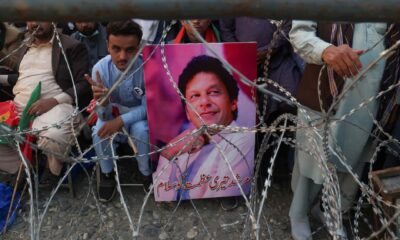
 Regional4 days ago
Regional4 days agoPakistan’s ex-PM Imran Khan gets bail in state gifts case, his party says
-
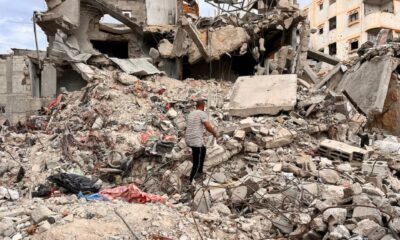
 World4 days ago
World4 days agoUS vetoes UN Security Council resolution on Gaza ceasefire
-

 Latest News4 days ago
Latest News4 days agoUN moves to unlock stuck climate financing for Afghanistan
-

 Sport4 days ago
Sport4 days agoPakistan trumps Afghanistan by only 13 runs in U19 Tri-Series One Day match
-
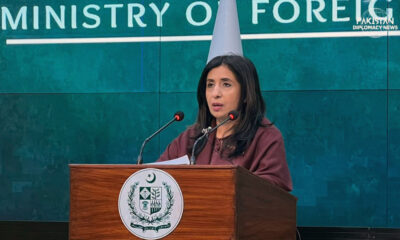
 Latest News3 days ago
Latest News3 days agoPakistan rejects suggestion of appointing a new special envoy for Afghanistan


